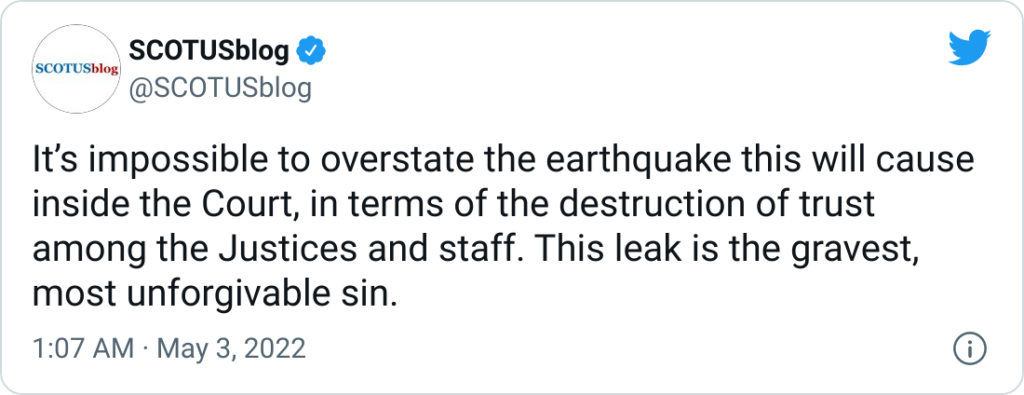I doubt it.
First of all, the Alito draft isn’t necessarily the court’s decision. Most people assume it is, but we’ll have to wait and see.
Second, the Supreme Court doesn’t have much of a reputation to begin with, and you can’t lose something you don’t have.
Occasionally the court does something egregiously right, as when it overruled Plessy v. Ferguson (1896), the apartheid case, in Brown v. Board of Education (1954); but for most of its history, the Supreme Court has been an enforcer for America’s reactionary forces, so it begins with strikes against it. The court makes its biggest news when it issues a decision that isn’t unpopular.
Ian Millhiser, a lawyer, book author, and writer for Vox magazine, points out that it “historically been a malign force within the United States.” By that he means, “The Court was the midwife of Jim Crow, the right hand of union busters, and the dead hand of the Confederacy, and is now one of the chief architects of America’s democratic decline.” All of which is undeniably true.
The conventional response to the leak of Alito’s draft is the one below.
This will leave many people laughing (or scowling) at the irony, because Alito’s opinion is an earthquake, and they see the court’s decisions on a multitude of issues as the “grave and unforgivable sin.” To them, how some of these justices even got on the court also is grave and unforgivable.
A CNN headline says, “The Supreme Court’s legitimacy has been pierced” (see the article here). Maybe, but not for the first time. The court’s decision in Dred Scott v. Sanford (1857) helped precipitate the Civil War. The court has upheld, in addition to slavery and apartheid, forced sterilization, concentration camps, opposed labor rights, and struck down a ban on child labor (see rap sheet here).
The Supreme Court is perennially the most conservative of America’s three branches of government. It is perpetually behind the curve on social progress and the public mood. And no matter how much chief justices may try to pretend it’s an impartial arbiter of the law, it’s a political branch; it’s members are politically appointed, politically vetted, and make political decisions.
Which is more or less okay when they’re also pragmatic decisions. Roe v. Wade was a political decision, and frankly, its reasoning isn’t all that sound. Even legal scholars who support abortion aren’t impressed with it. But it didn’t have to be a great decision by intellectual standards; it was (arguably) a good decision because it (arguably) saved lives by ending back-alley and coat-hanger abortions that were killing women in large numbers.
It’s not really accurate to say the Supreme Court is a product of its times, because it tends to lag behind the times. It’s inconsistent, and goes up and down in popularity and respectability. Lately it seems to be going backwards on an array of issues, or at least it often feels that way. Perhaps not least because, as Millhiser says, its most salient current project is “dismantling democracy.” It upheld corporate “dark money” in political campaigns, intervened in a presidential election, and greenlighted gerrymandering. No wonder Trump thought it would participate in a coup.
As a result of all this, and the most undemocratic manner in which its member were appointed, “The Court, in other words, simply does not deserve the reverence it still enjoys in much of American society,” Millhiser says. I’m a little more circumspect; I think it’s more deserving of reverence at some times than other times. The reality is it’s a political body, and it has been captured again by the reactionary elements of American society. We’ve seen this before.
And like Putin brandishing his nuclear weapons, it is what it is.
